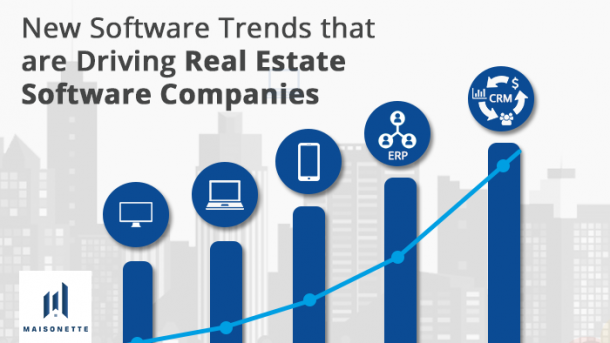Like just about every other industry in our rapidly-changing world, Real Estate Software Companies is in a constant state of evolution — so long as those in the industry are willing to stay in sync with the latest trends. Each day in the life of a property manager today dramatically differs from that of a decade ago as the technology is transforming property management, redefining the future of real estate.
Modern office and multifamily property managers have greater responsibilities beyond traditional rent collection and bill paying. The trends influencing commercial real estate are gaining prominence in residential property management as well. Property managers now arrange insurance; provide tax information; develop marketing plans; design and collect renovation bids; hire, manage, and motivate staff; improve landscaping; coordinate maintenance services; ensure compliance with government regulations; oversee property security, and report revenue and expenditures.
To perform these tasks, today’s property managers must assess and respond to changing market conditions and world events, be aware of new developments in technology, and find additional ways to increase fee revenue. At the same time, they must manage the personal client relationships that are so integral to their business.
Technological Advances
Technology has advanced, along with changing client needs. Property management software also has exploded in the last 15 years. Diverse advances in technology are helping property managers do their jobs more efficiently. As in most industries, computerisation has contributed some relief regarding data collection, manipulation, and storage, as well as new and better means of communication.
Many property management companies already have deployed terminal server platforms that allow their personnel to connect to company networks over the Internet and run applications in a Web browser or through a proprietary client. Advances in technology also have helped property managers analyse buildings energy consumption and develop strategies to manage energy more efficiently to lower total operating lease costs.
Cloud Services for Real Estate Management
Smart property managers are adopting cloud technology to manage properties and entire business ecosystems on-demand with high competence. Many project management software and solutions are tailor-made for both commercial and residential real estate industry, to help real estate professionals market, manage and lease their entire portfolio with ease.
Cloud-based technology continues to be an essential business tool. Seeing the current trends, it looks that, property managers and property owners are looking for solutions that would deal with the complexities and rigorous demands of the Real Estate industry. It is observed that many property managers would use multiple software and technology solutions if there had been a comprehensive software package designed and developed, that is tailor-made for this complex industry without over-complicating the process like Procurement & Inventory Management, Asset Management, and Lease Automation.
Cybersecurity for Smart Properties
Buildings are growing more and more connected to the Internet of Things, making cybersecurity is a growing interest. As real estate takes on this additional virtual layer, the protection of its digital property becomes as crucial as its physical one; in many cases, the two are linked.
Technology Improving Operations & Efficiency
Technology has transformed every facet of the property management industry. It has revolutionised the way property managers market their businesses, get new business, screen, and process applicants, interact with the clients and tenants, and manage the paperwork in their office from lease signings to accounting. With Real Estate software, it is easier than ever to scale their sales and expand portfolios.
Property Management Software now streamlines how the property management office functions which include posting property ads, giving tenants the ability to pay rent and report maintenance online. There are also few real estate software companies that provide tailored solutions that offer you features that will suit your business requirements like publish move in/ move out, and property inspections report with photos attached.
The property management software landscape is continuously evolving and ever-changing. It has become an appealing yet highly competitive industry with more companies opening for market constantly. Consequently, property management software companies and their customers have an opportunity for increased growth and acquisitions. For the investor who is yet to partner with a real estate software company, this is the best time to take complete advantage of the changing trends.
Analytics Platforms
Big data is changing all industries, including Real Estate Software Companies. The technology helps property owners and investors analyze every aspect of property or market. Consequently, they make smarter decisions concerning the acquisition, management, and disposition. With billions of money at stake, it’s no surprise real estate software companies has experienced an explosion of platforms offering significant data evaluation and analytics.
Final Verdict
Technology can help enhance the overall operations and efficiency of property management. Real estate software companies is proliferating, and so is the real estate software trends. Property managers and owners are looking for more comprehensive solutions that can seamlessly tackle the complete lifecycle and eliminates the hassle of the business process enabling professionals to focus on their clients.
The overall theme is that technology is — and will continue — shaping property management’s improvement. Adopting these trends will help tenants and industry insiders alike move more seamlessly, and harmoniously, into the future of real estate

No Comments, Be The First!